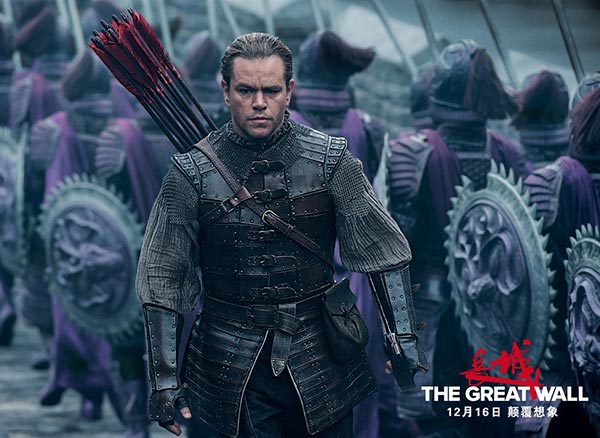'Great Wall' of controversy over Matt Damon casting
 0 Comment(s)
0 Comment(s) Print
Print E-mail China Daily, August 4, 2016
E-mail China Daily, August 4, 2016
The movie trailer for the Zhang Yimou-directed The Great Wall was supposed to spark discussion about China-Hollywood film collaborations, but instead is being criticized for whitewashing Asian history.
The upcoming fantasy thriller about the Great Wall of China stars American actor Matt Damon as the protagonist who battles dragons besieging the wall built to protect China.
|
|
| Matt Damon in The Great Wall. [Photo / Mtime] |
Critics ripped into the trailer, saying that it was another example of Hollywood racial bias in casting.
Constance Wu, star of the ABC sitcom Fresh Off the Boat, posted on Twitter that Hollywood needs to stop perpetuating the myth that "only a white man can save the world. It's not based on actual fact."
Others brought up comparisons to The Last Samurai, a 2003 movie starring Tom Cruise, about a retired US military officer hired to train the Japanese Army that, though critically received at the time, was criticized for featuring a white protagonist in a story about non-white ethnic groups.
The Great Wall, due for release in 2017, is highly anticipated by China-Hollywood watchers as it's Zhang's first English-language film and and could be the most expensive Chinese movie of all time. It also stars Andy Lau, Willem Dafoe, Eddie Peng and Pedro Pascal.
The movie, a China-Hollywood co-production, will be distributed overseas, with its defenders saying that the plan to market it abroad is why Damon was cast.
However, some critics countered that Chinese co-financing is not a legitimate reason for casting Damon as a "white savior" in the movie.
"Money is the lamest excuse in the history of being human. So is blaming the Chinese investors. (POC's [people of color's] choices can be based on unconscious bias too)," Wu wrote on Twitter.
The director said in an interview with Entertainment Weekly that the movie is a Hollywood film and "needs to be made in that style".
Zhang said he didn't want to change that approach and that there was no need to do so.
"What I really want is to bring Chinese color and cultural background to the worldwide audience through a film language that they are familiar with," he said.
Brian Hu, artistic director at the Pacific Arts Movement, said that Hollywood is still a Caucasian-dominated industry, and members make decisions that affect minorities.
"Hollywood is not just a group of actual companies, but a state of mind that a lot of companies all over the world try to achieve. This is Hollywood as a way of domination in film," he said.
"If you think about it that way, even though this is a Chinese co-production, it's very much made in a Hollywood mold. It's a Chinese co-producing to try to achieve the dominance of Hollywood," Hu said.
Mike Le, a writer at pop culture advocacy site Racebending, said that the movie is still "fundamentally Western with Western creative forces, with a mainly Western audience in mind. Otherwise, why film it in English?" Chinese financing is secondary, he added.
Supporters of the movie have referred to Ghost in the Shell — in which a Japanese story with Japanese characters was adapted with Scarlett Johansson in a leading role — arguing that audiences in China like Hollywood stars and want to see them in big blockbuster movies.
However, Le said that response is prejudicial because it "assumes that Asian Americans and Chinese nationals have the same concerns, simply due to shared race. Asian-American concerns are unique to Asian-American identity."
"It's patently absurd that a tale set in ancient China would feature a white man so prominently, and the only reason people accept it without blinking is because of institutional racism," he said.
Raymond Zhou, a movie critic for China Daily, said that for all the progress made in the past half century, "Hollywood is still not ready for an Asian lead, with a few exceptions such as Jackie Chan action movies and period pieces set in China.
"Given the state of globalization, this is a deplorable situation," he said. "But I believe it is based on the bottom line rather than on artistic or political consideration."
Zhou said that he does not believe that all roles need to be played by Chinese actors just because the Great Wall is a Chinese icon, citing that the monsters in the film aren't Chinese, yet they're part of the story.
"Political correctness will not change Hollywood's casting department," he said. "But it listens to the market."







Go to Forum >>0 Comment(s)